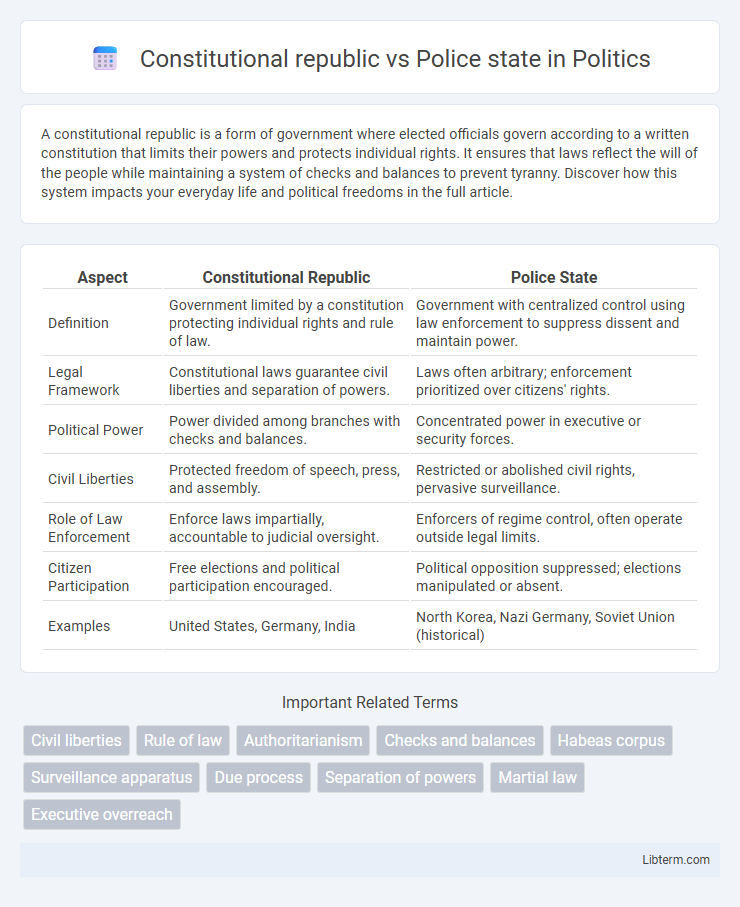A constitutional republic is a form of government where elected officials govern according to a written constitution that limits their powers and protects individual rights. It ensures that laws reflect the will of the people while maintaining a system of checks and balances to prevent tyranny. Discover how this system impacts your everyday life and political freedoms in the full article.
Table of Comparison
| Aspect | Constitutional Republic | Police State |
|---|---|---|
| Definition | Government limited by a constitution protecting individual rights and rule of law. | Government with centralized control using law enforcement to suppress dissent and maintain power. |
| Legal Framework | Constitutional laws guarantee civil liberties and separation of powers. | Laws often arbitrary; enforcement prioritized over citizens' rights. |
| Political Power | Power divided among branches with checks and balances. | Concentrated power in executive or security forces. |
| Civil Liberties | Protected freedom of speech, press, and assembly. | Restricted or abolished civil rights, pervasive surveillance. |
| Role of Law Enforcement | Enforce laws impartially, accountable to judicial oversight. | Enforcers of regime control, often operate outside legal limits. |
| Citizen Participation | Free elections and political participation encouraged. | Political opposition suppressed; elections manipulated or absent. |
| Examples | United States, Germany, India | North Korea, Nazi Germany, Soviet Union (historical) |
Understanding Constitutional Republics
A constitutional republic operates under a framework where government powers are limited by a constitution, ensuring individual rights and the rule of law guide political authority. Unlike a police state, where government control is exercised through extensive surveillance, suppression of dissent, and arbitrary enforcement, constitutional republics emphasize transparent governance and accountability. Citizens in constitutional republics enjoy protections such as due process, free elections, and checks and balances that prevent authoritarianism.
Defining a Police State
A police state is defined by centralized government control using law enforcement agencies to suppress political opposition, restrict civil liberties, and monitor citizens extensively. Unlike a constitutional republic, which operates under a system of checks and balances protecting individual rights and rule of law, a police state prioritizes state security and authority over personal freedoms. Characteristics of a police state include widespread surveillance, arbitrary arrests, censorship, and the absence of transparent legal processes.
Key Principles of Constitutional Governance
A constitutional republic is founded on the key principles of limited government, separation of powers, and rule of law, ensuring individual rights and accountability through a codified constitution. In contrast, a police state centralizes authority in law enforcement agencies, often bypassing legal protections and due process, leading to arbitrary control and suppression of civil liberties. The constitutional governance framework mandates checks and balances designed to prevent abuses of power and protect citizens from authoritarian overreach.
Hallmarks of a Police State System
A police state is characterized by pervasive government surveillance, restricted civil liberties, and authoritative control through law enforcement agencies wielding unchecked power. Unlike a constitutional republic, where constitutional limits safeguard individual rights and promote democratic governance, a police state enforces compliance via intimidation, censorship, and suppression of political dissent. Hallmarks include arbitrary arrests, lack of judicial independence, and state-controlled media that eliminates transparency and accountability.
Civil Liberties and Individual Rights
A constitutional republic prioritizes civil liberties and individual rights by establishing legal frameworks that limit government power and protect freedoms such as speech, privacy, and due process. In contrast, a police state often undermines these rights through extensive surveillance, arbitrary detention, and suppression of dissent to maintain control and order. The balance between rule of law and governmental authority distinctly impacts citizens' freedoms and the scope of personal autonomy in each system.
Rule of Law: Theory and Practice
A constitutional republic upholds the rule of law by ensuring that all government actions comply with a codified constitution, protecting individual rights and limiting arbitrary power. In contrast, a police state often disregards the rule of law, allowing law enforcement and government officials to operate with unchecked authority, suppressing dissent and violating civil liberties. The practical enforcement of rule of law in a constitutional republic creates accountability and transparency, whereas in a police state, the rule of law is subordinated to the interests of those in power.
Government Accountability and Transparency
A constitutional republic upholds government accountability through codified laws limiting power and ensuring transparency via separation of powers, free press, and public oversight mechanisms. In contrast, a police state prioritizes control and surveillance, often bypassing legal constraints, resulting in opaque governance with minimal transparency or accountability. This lack of checks facilitates abuse of authority, eroding civil liberties and undermining public trust.
Law Enforcement Powers and Limits
In a constitutional republic, law enforcement powers are defined and restricted by a legal framework ensuring accountability, transparency, and protection of individual rights through due process and judicial oversight. Police state systems concentrate authority in law enforcement agencies with minimal checks, often enabling arbitrary arrests, surveillance, and suppression of dissent. Constitutional limits, such as warrants and constitutional rights, contrast sharply with the unchecked power characteristic of police states.
Impact on Society and Citizen Participation
A constitutional republic ensures the protection of individual rights and promotes active citizen participation through representative democracy, fostering societal stability and accountability. In contrast, a police state relies on centralized power and extensive surveillance, suppressing dissent and limiting public involvement, which often leads to social unrest and erosion of trust. The fundamental difference lies in how each system balances authority with citizen empowerment, directly shaping societal cohesion and freedom.
Safeguarding Democracy Against Authoritarianism
A constitutional republic ensures the protection of individual rights and the rule of law through a system of checks and balances, limiting governmental power and safeguarding democracy from authoritarian overreach. In contrast, a police state centralizes authority in law enforcement agencies, often suppressing dissent and eroding civil liberties under the guise of maintaining order. Safeguarding democracy requires adherence to constitutional principles that prevent arbitrary rule and uphold citizens' freedoms against authoritarian control.
Constitutional republic Infographic

 libterm.com
libterm.com